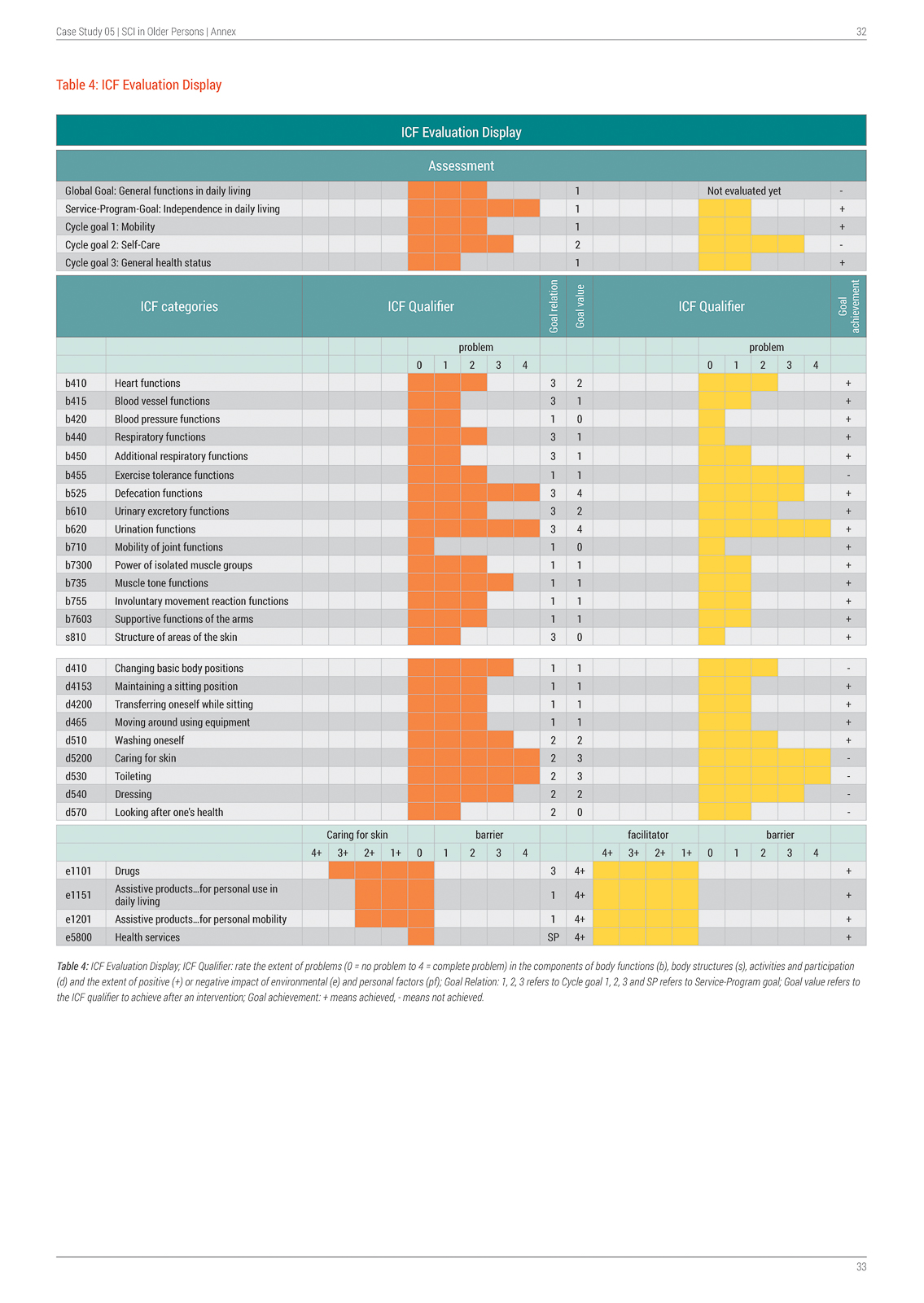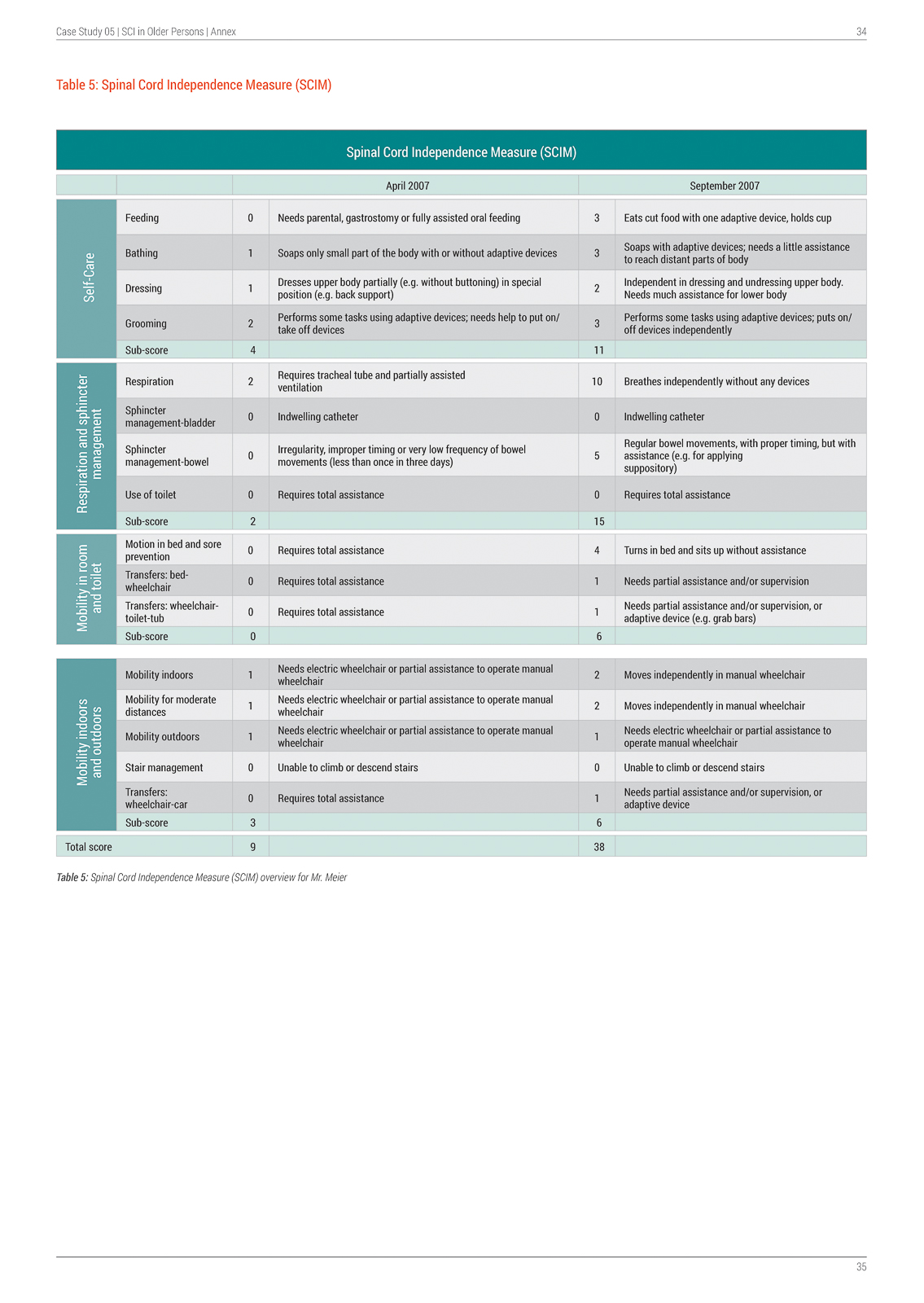Evaluation
I didn’t achieve as much as I wanted to. I still can’t walk!
Mr. Meier at the end of his Rehab-Cycle®
Despite the complications that arose, Mr. Meier was able to make progress in his Rehab-Cycle®, achieving two of his three cycle goals: mobility and general health status. This was clearly seen during the evaluation phase.
At the evaluation, the physical therapist found that Mr. Meier’s mobility had improved. For example, the power in isolated muscles and muscle groups increased, and Mr. Meier's mobility was better when using equipment/assistive devices. His general health status also showed improvement due to better cardiovascular and excretory functioning.
The ICF Evaluation display gives a detailed overview of goals, intervention targets, as well as assessment and evaluation results for comparison. See table 4.

Table 4: ICF Evaluation Display; ICF Qualifier: rate the extent of problems (0 = no problem to 4 = complete problem) in the components of body functions (b), body structures (s), activities and participation (d) and the extent of positive (+) or negative impact of environmental (e) and personal factors (pf); Goal Relation: 1, 2, 3 refers to Cycle goal 1, 2, 3 and SP refers to Service-Program goal; Goal value refers to the ICF qualifier to achieve after an intervention; Goal achievement: + means achieved, - means not achieved.
As seen on the ICF Evaluation Table, Mr. Meier's cycle goal for self-care was unfortunately not reached. This was primarily due to a lack of improvement in a number of specific intervention targets, namely caring for the skin, toileting and dressing.
For the improvements that did occur, the spinal cord independence measure (SCIM) score increased from 9 to 38 out of 100 possible points, with the largest gains in independent respiration and the ability to turn and sit up in bed. See table 5.

Table 5: Spinal Cord Independence Measure (SCIM) overview for Mr. Meier
The SCIM results for Mr. Meier in self-care did demonstrate some improvement – in eating and holding a cup, soaping with adaptive devices, and putting on and taking off these devices independently. Unfortunately these accomplishments fell short of what had been hoped for by the team and Mr. Meier himself.
The self-care activities that did not show the expected improvement were all the activities that required coordination of multiple tasks. For Mr. Meier multi-tasking was probably difficult given his impaired memory functions that was observed during the intervention phase when dementia-like symptoms unexpectedly appeared. This, in turn, limited the extent of improvement in self-care activities.
With consideration of Mr. Meier's age and general health condition, there was some improvement in his functional outcomes. Still his existing heart disease, his reduced exercise tolerance and the limitations on physical activity all had an effect on his rehabilitative training and was expected to impact on Mr. Meier's future functioning.
At the evaluation, he had not been able to recall and execute the required steps to complete certain tasks, such as transferring himself into a car or from his bed to a wheelchair. Due to reduced memory functions Mr. Meier will most likely require assistance in the future and will have to learn different strategies e.g. memorizing steps of the task to more effectively perform certain coordinated complex activities.
Given his mental and physical health condition, I don't anticipate an improvement in his functional outcome.
Mr. Meier's physical therapist at the end of the Rehab-Cycle®